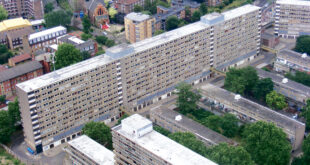THEO Vis died in a Bundaberg aged care facility with a pressure sore on his back so severe it had eaten through to his coccyx and infection had spread up into his back, according to his partner.
Mr Vis, 96, suffered from bone and prostate cancer, but it was well managed and medicated, according to his partner Cinnamon Keighton.
But on April 21, Ms Keighton discovered that a pressure sore that had been minor when she attended a GP appointment with Mr Vis in December, had eaten through his flesh and into the spinal cord of his lower back.
He died that night, on Easter Sunday.
A pressure sore on Mr Vis’s back, which his partner has alleged went through to his coccyx. Contributed
“I had, for quite a number of days beforehand, slept overnight and stayed during the day, caring for him,” Ms Keighton said.
Ms Keighton said Mr Vis, in his final days, was “quite sick” but still able to squeeze her hand in response to things she said.
On the day of the 21st, Ms Keighton said no nursing staff had visited her partner until around 2.30pm when they said they wanted to change a dressing on his back.
Ms Keighton said it was standard practice for staff to document ailments in photos and she had been asked to take a photo of the sore while the staff turned him over, exposing his back.
Ms Keighton said a GP had advised cleaning the wound with saline and Betadine every second day and said she had advised staff of seepage on at least one occasion.
What she saw under the dressing horrified her, but despite the severity of the pressure sore, she says no action was taken.
“Nothing was done to clean it up, no medical practitioner was rang – nothing, other than it was covered back up again with a fresh patch and they left the room,” Ms Keighton said.
The Bundaberg woman levelled blame at a lack of communication within the facility, because a fax had been sent to Tri Care from her GP in December, advising the course of treatment needed for Mr Vis’s then stage one pressure sore.
The NewsMail understands this fax was not uploaded onto TriCare’s computer system and there was no record made of Mr Vis’s pressure sore until April when staff finally acknowledged the pressure sore.
There is no indication a registered nurse was consulted at that stage.

Theo Vis in February. Contributed
At around 5pm on April 21, Ms Keighton went to run some errands before returning to TriCare to be beside her partner, and had asked the staff to call her if he started to deteriorate.
The call she received at 8.24pm was to tell her he had died. She rushed to Tri Care to find that undertaker had been contacted and arrived, a fax sent to the doctor listed Mr Vis’s cause of death as terminal cancer.
Ms Keighton lodged a case with the Coroner, wanting to know whether the pressure sore contributed to her partner’s death.
A spokeswoman for the Coroners Court of Queensland confirmed the case was being investigated, but no findings had yet been released.
“The death of Theodorus Vis has been reported to the Coroner for Central Queensland, Magistrate O’Connell,” she said.
“The coronial investigation is ongoing.
“The time any coronial investigation takes depends on a variety of matters including the complexity of the coronial issues involved.
“The matter remains under coronial investigation at this time.”
Ms Keighton also lodged a submission to the Aged Care Royal Commission.
In the wake of her complaints to the Coroner and the royal commission, Ms Keighton says she has been told not to attend Bundaberg’s Tri Care facility to visit other residents who she had connected with in her time at the home.
She said she managed to argue for another room for the resident, which took months.
She said she feels she has been bullied and harassed and that residents are suffering because they want to interact.
Ms Keighton said many residents were lonely and often enjoyed having someone to talk to and assist them with minor tasks.
She said carers were often too busy to spend time talking to listening to residents.
“Sometimes I have found myself advocating/speaking up for residents who feel nobody is really listening to them, when some of their daily needs are not being met and/or need assistance with carrying out their daily care needs,” she said.

Theo Vis in February, about two months before he passed away. Contributed
In a video sighted by the NewsMail, Ms Keighton is told to leave the Tri Care building during a visit to residents.
A member of staff tells her she will need to leave the building after Ms Keighton asks staff for a vase for a resident’s flowers.
“That’s my direction, I’m only doing what I’ve been asked,” the worker says.
When Ms Keighton asks where the direction came from, she is told it came from the Brisbane head office.
“If you want to take it further, please do,” the woman tells her.
When Ms Keighton says she just wants to go and say hello to a resident she knows, she is told “excuse me, no”… the worker then declares it “police time”.
Disappointed residents can be heard asking why they’re not allowed to see Ms Keighton.
Ms Keighton said many residents were in need of extra support she enjoyed providing, and showed photos of one resident’s room where several electric cords were strewn over the floor.

Cords on the floor at TriCare Bundaberg. Contributed
The NewsMail sent questions to TriCare regarding Ms Keighton’s concerns, however, no response was received before time of print.
At the time of print, outcomes from the royal commission and coronial investigation were yet to come, with a cause of death yet to be determined.
TriCare in the news:
Claims mum was neglected at facility
Alley Foody and her siblings said goodbye to their mother, Emily, on January 12, 2017.
Just over two weeks earlier they say she was “neglected” at the Bundaberg aged care facility TriCare.
At the time, TriCare director Michael O’Connor strongly refuted claims that the company does not employ enough staff and urged anyone with issues to contact TriCare or the Aged Care Complaints Commissioner.
Emily’s family claimed her pressure sore dressing was not changed enough and that she was frequently left in soiled nappies.
Man suffers bleeding scrotum
In February 2017, the NewsMail broke the story of Heather Mansell-Brown, who said her husband had been left on a varanda covered in his own faeces at TriCare Bundaberg in 2015.
In 2017, Mrs Mansell-Brown said her husband, who suffered from dementia, was left in a urine-soaked pad for 12 hours, which caused his scrotum to tear and bleed. At the time, TriCare director Michael O’Connor said he could not comment on specific cases, but said the facility maintained high standards and was monitored and accredited with the Aged Care Quality Agency.
Man breaks femur
In March 2017 a local family called for more funding into aged care as well as nurse to patient ratios after Toby Hewerdine broke his femur in the facility.
Ms Arnold said her father was left crying in pain for days when his broken leg was left undiagnosed, despite repeat calls for an X-Ray from the family.
Some of the claims made by the family included: finding their once-proud father lying in faeces, half out of the bed on the floor; another time left soaked in urine while left to watch television without glasses or hearing aids.
The family were so concerned about their father they put a poster up in his bedroom to remind staff of what needed to be done for him.
The report came as TriCare was declared as delivering quality standards of resident care after two audits in two months.
Staffer launches claim
In May this year TriCare again made headlines when a woman lodged a Supreme Court claim against the facility after she claimed a back injury acquired on the job had left her unable to work.
Lillian Annette Evans, 38, claimed she was left to tend to a violent and strong 80-year-old dementure patient without assistance from any other staff.
She claimed when she bent over to help the man, she twisted her body, injuring her lower back.

The Queensland Nurses and Midwives’ Union has spoken out.
Queensland Nurses and Midwives’ Union organiser Linda Fuller on the crisis in aged care:
In the face of Australia’s aged care crisis, it’s critical we discuss the impacts chronic understaffing is having on thousands of vulnerable aged care residents.
Australia has no federal laws that determine how the nation’s 2000-plus private aged care facilities must be staffed.
There is no federal law that states even one Registered Nurse (RN) must be on site to assist elderly residents at all times.
In Australia, it is not illegal to leave a single RN with an uncapped number of elderly residents.
It is also not illegal for a growing number of private aged care facilities to transfer the administration of potentially life threatening medications from nurses to Assistants in Nursing (AiNs) and unregulated and often largely untrained Personal Carers (PCs).
AiNs and PCs are an extremely valuable resource, but should not be made responsible for the administration of potentially dangerous and multiple medications.
The QNMU has raised repeatedly raised extremely serious concerns about this practise with federal aged care authorities and the Royal Commission Into Aged Care.
It is not believed aged care providers inform residents or their families when medication administration is transferred from nurses to PCs.
The federal government, which is responsible for private aged care, has the power to make change to protect elderly Australians but has repeatedly refused to do so.
As a result, elderly Australians are experiencing unnecessary pain, suffering and premature death due to chronic and dangerous understaffing in almost every community.



